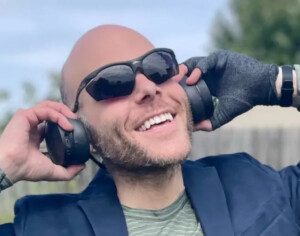Today I finally accepted my diagnosis. I am 38 and at the age of 35, I was diagnosed with autism.
In the time leading up to today, I have tried to communicate that I had this diagnosis to family, friends and colleagues, with the belief that I was allowing them to feel relief.
I see now that I was attempting to brainwash, rather unsuccessfully I might add, into internalizing my several-times-confirmed diagnosis.
Today was different though, and while watching a human interest piece on the treadmill, my heart, mind and perhaps soul, opened up enough to let in the reality that I am an autistic adult.
The segment I was watching had a young man with autism whose father succinctly defined it as “finding overwhelming joy in the most underwhelming minutia.” Thank you Steve Harman of CBS for that perfect definition.
Is my autism a disability? In short, yes, because it does impose the need for accommodations for my sight, hearing, touch and other parts of perception.
Communication and perception are perennial and persistent characteristics of my life.
Social, noisy, bright situations — all are a challenge. Now am I less capable intellectually due to my autism than my neurotypical peers? Probably not, perhaps the opposite?
I have always had autism; it had gone undiagnosed for 35 years until several examinations after a car accident.
The traumatic brain injury that ensued heavily amplified all of my personality “quirks” into clear symptoms of a neurology with highly amplified autism.
When I was in eighth grade, I filed for my first patent; when I was 16, I had my first scientific article published; and later took 31 credits in a single semester while attending my alma mater — these were all clearly signs of an overwhelming joy in the most underwhelming minutia.
In fact, I am a tax, estate planning and nursing home eligibility attorney who feels overwhelming joy when I help people achieve their life goals.
The motor vehicle accident has caused partial, though permanent, physical disabilities and chronic pain.
Within the reliquary of rationalization that is processing trauma, it makes more sense to identify those more corporeal injuries as disabling in the general sense of a limitation or handicap.
My autism requires accommodations that but for their existence, mine would be challenging to near impossible.
Yet, there are no true accommodations for the injuries caused to my brain from a TBI or to the body when my L2 vertebrae breaks and heals improperly, or to the psychological trauma of losing yourself in losing everything.
Therefore, those injuries, more so and in a different category altogether, are truly disabilities.
My autism is more of a black box mystery that I am still trying to understand. People enter my office oftentimes, at the precipice of giving up.
Perhaps they just found their elderly loved-one eating cat food, or their recently diagnosed child needs a special needs trust planning, but they still have not processed the news.
That is where the true essence of autism shines through: unwavering compassion. The high levels of compassion are a trademark of our neurology.
Therefore, if we are known for our “overwhelming joy in the most underwhelming minutia,” perhaps that uniqueness also gives the most necessary of all human traits as well: compassion.
That part of me will always be my greatest strength.
 Brad Biren, Esq, LL.M, specializes in assisting individuals with special needs and diverse talents who are overcoming sudden adversity. He utilizes his inspiring tale of overcoming unexpected adversity to help motivate others in the community to pursue their goals. As of 2025 he is 41.
Brad Biren, Esq, LL.M, specializes in assisting individuals with special needs and diverse talents who are overcoming sudden adversity. He utilizes his inspiring tale of overcoming unexpected adversity to help motivate others in the community to pursue their goals. As of 2025 he is 41.
.
Top image: Mirza Babic
Do Autistic People Feel Different Among Other Autistic People?
I’m Autistic, Identity First Language! I Don’t “Have Autism”
Can Autism Be Ruled Out if the Patient Has Good Eye Contact?



























